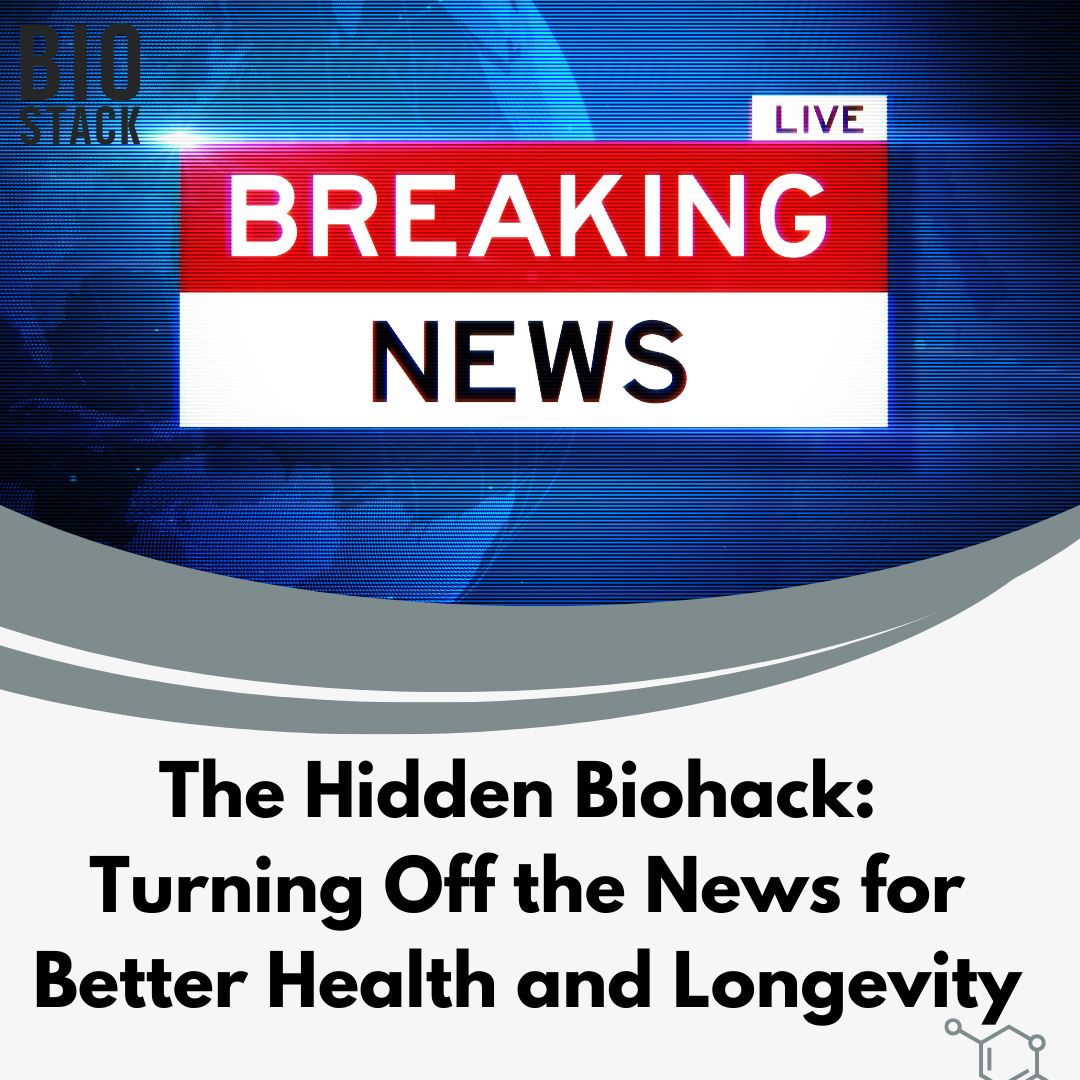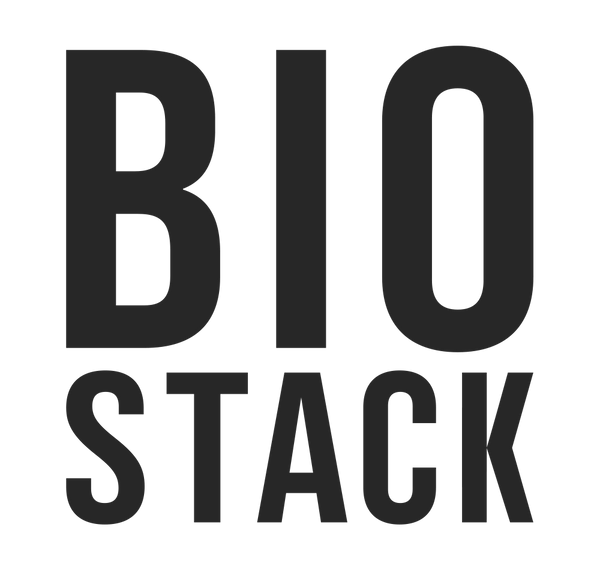
The Hidden Biohack: Turning Off the News for Better Health and Longevity
Share
"Why Health Optimizers and Biohackers Choose to Tune Out the News for a Thriving Mindset"
Biohackers and health optimizers often push boundaries, testing innovative tools, techniques, and mindsets to unlock peak performance. Among their many strategies, one unconventional habit stands out: intentionally tuning out the news.
At first glance, this might seem like a head-scratcher. In today’s hyper-connected world, staying informed feels like a badge of honour, a civic duty even. But for many health enthusiasts, cutting back on news consumption—or avoiding it entirely—is a deliberate choice rooted in science and self-care. This decision isn’t about ignorance; it’s about energy, focus, and protecting the mind from a constant barrage of negativity.
In this blog, we’ll dive into why many biohackers choose to step back from the news cycle, the science behind its effects on the brain, and how to create a more intentional relationship with information to support your health and mindset.
The News and Your Brain: A Stressful Relationship
Let’s face it: the news is rarely uplifting. Most headlines are designed to grab your attention by triggering strong emotional reactions like fear, anger, or sadness. This isn’t by accident—media outlets know that heightened emotions keep you engaged. But this constant exposure to negativity comes with a cost, particularly to your mental and physical health.
The Stress Response
When you consume negative news, your brain activates the amygdala, the region responsible for processing threats. This triggers the "fight or flight" stress response, releasing cortisol and adrenaline into your system. While this response is essential for short-term survival, chronic activation can lead to harmful effects, including:
- Increased anxiety and depression.
- Impaired immune function.
- Disrupted sleep patterns.
- Difficulty concentrating.
Negativity Bias
Humans are wired to pay more attention to negative information—a phenomenon known as negativity bias. This evolutionary trait once helped us survive by alerting us to dangers. Today, however, it can lead to overconsumption of bad news, leaving us feeling helpless, hopeless, or overly pessimistic about the world.
Why Biohackers and Health Optimizers Avoid the News
For biohackers, the goal is simple: optimize every aspect of life, including the mind. Many have realized that consuming too much news conflicts with this goal, draining mental energy and disrupting focus. Here are the key reasons they choose to tune out:
1. Protecting Mental Energy
The brain, like the body, has limited energy reserves. Negative news can create a cycle of worry, distracting you from productive tasks or creative pursuits. By avoiding unnecessary mental clutter, biohackers preserve their focus for things that truly matter.
2. Supporting Emotional Resilience
A constant stream of bad news reinforces negative thought patterns, which can erode emotional resilience. Health optimizers often replace news consumption with practices like meditation, gratitude journaling, or listening to uplifting podcasts to cultivate positivity.
3. Prioritizing Sleep Quality
Consuming distressing news, especially in the evening, can elevate cortisol levels and interfere with your body’s natural wind-down process. Poor sleep has cascading effects on energy, recovery, and cognitive performance—key pillars of biohacking. By avoiding news before bed, biohackers safeguard their sleep hygiene.
4. Focusing on Actionable Information
Instead of passively consuming news, biohackers seek actionable knowledge that aligns with their goals. Whether it’s learning about the latest longevity research or testing new wellness tools, they prioritize content that empowers rather than overwhelms.
The Science Behind Protecting Your Mindset
There’s plenty of research to back up the idea that reducing exposure to negative news can have profound effects on well-being:
- Chronic Stress and Cortisol: Prolonged exposure to stress-inducing content keeps cortisol levels elevated, which can lead to inflammation, weight gain, and impaired brain function.
- Neuroplasticity: The brain is constantly rewiring itself based on your experiences. Focusing on negativity reinforces pessimistic neural pathways, while positive stimuli encourage optimism and resilience.
- Cognitive Load: The brain can only process so much information at once. Consuming too much news creates cognitive overload, reducing clarity and decision-making ability.
How Biohackers Curate Their Information Intake
Avoiding the news entirely might not be realistic—or desirable—for everyone. Instead, health optimizers often create a deliberate relationship with information that minimizes harm while maximizing benefits. Here’s how:
1. Selective News Consumption
Instead of doom scrolling, biohackers curate their news sources carefully. They might subscribe to weekly email digests or rely on apps that summarize important events without sensationalism.
2. Time-Boxed News Sessions
Some people set specific times during the day to check the news—say, 10 minutes in the morning—rather than dipping in and out throughout the day. This prevents the habit from taking over their mental space.
3. Seeking Solutions-Focused Content
Rather than fixating on problems, many health optimizers gravitate toward content that highlights progress, innovation, or human resilience. This helps them stay informed without becoming discouraged.
4. Digital Detox Days
Regular "off-grid" periods are common in the biohacking community. Whether it’s a tech-free weekend or simply turning off notifications for a day, these breaks help reset the nervous system.
What to Replace the News With
So, what do biohackers and health optimizers do instead of consuming the news? Here are a few activities that promote a healthier mindset:
- Morning Meditation: Start the day with clarity by meditating instead of scrolling through headlines. Apps like Calm or Headspace make this easy.
- Gratitude Journaling: Write down three things you’re grateful for each day. This simple practice rewires the brain for positivity.
- Educational Podcasts: Listen to uplifting, solutions-driven podcasts that expand your knowledge without stressing your mind.
- Nature Walks: Spending time outdoors boosts mood, reduces stress, and enhances creativity.
- Skill Building: Replace passive news consumption with active learning—whether it’s taking up a new hobby, reading a book, or pursuing a passion project.
The Longevity Perspective: Why Mindset Matters
Longevity isn’t just about living longer; it’s about living better. A healthy mind is as crucial as a healthy body in achieving this goal. By reducing exposure to negativity, biohackers create mental clarity, resilience, and emotional balance—all of which contribute to a longer, more fulfilling life.
Moreover, mindset shifts often have a ripple effect. When you stop focusing on fear and negativity, you have more mental energy to invest in relationships, personal growth, and community building—key factors for a meaningful and happy life.
Reclaim Your Mental Space
At the heart of this practice is the idea that you have the power to choose what occupies your mind. While the news can feel all-encompassing, you don’t have to let it dictate your emotions, focus, or energy. By stepping back from the negativity and curating your information intake, you can reclaim control over your mental space and build a foundation for thriving health.
So, the next time you feel the urge to check the news, ask yourself: Is this adding value to my life, or is it draining my energy? Your mind—and your longevity—will thank you.
